Call for ARCUS Committee Member Nominations
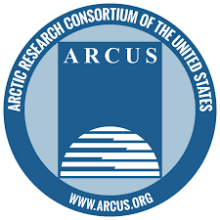
To continue discussions initiated at our 2020 Annual Meeting, ARCUS announces a call for nominations for members to serve on a new ad hoc committee that will focus on building the Arctic research community’s capacity for interdisciplinary and transdisciplinary research. Committee members will serve a 1-year term and will play an important role in developing the initial goals and direction of this new group’s efforts, and provide input to ARCUS’ activities around this topic. Committee members will be expected to join virtual meetings approximately 4-6 times through the year, and will have additional opportunities to work on specific activities. Self-nominations from all disciplines, career levels, and research backgrounds are welcome. Stipends may be available for committee members, depending on the scope of time and involvement of the committee member.
Self-nominations should be sent to Brit Myers at brit [at] arcus.org by Monday, 15 February and include:
- Name, Affiliation, & Contact Information
- Resume, CV, or link to a professional webpage
- A brief statement explaining why you would like to be part of the committee and what you would like to contribute.
Arctic Research Seminar Series with Dr. Kent Moore
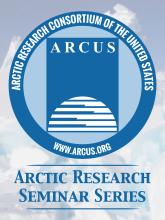
ARCUS invites registration for the next Arctic Research Seminar featuring Dr. Kent Moore, Professor of Physics and Vice-Principal Research at the University of Toronto Mississauga. Dr. Moore’s presentation, titled Anomalous Collapses of Nares Strait Ice Arches Leads to Enhanced Export of Arctic Sea Ice will be held via Zoom on Tuesday, 16 February 2021 at 9:00 a.m. AKST (1:00 p.m. EST). Registration is required for this event.
Witness Community Highlights

The January 2021 issue of Witness Community Highlights is now available online. This issue includes the article, “The 2020 Arctic Report Card.” The Arctic Report Card, initiated in response to the need for concise and timely Arctic information, serves as a readily available resource for viewing the rapid changes that have engulfed the region. This article shares highlights from The 15th annual NOAA Arctic Report Card, which was released on 8 December 2020 as part of the American Geophysical Union 2020 Fall Meeting.
Arctic Research Speed Networking Event
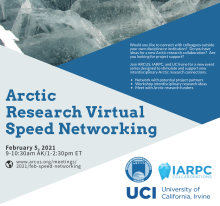
Join IARPC Collaborations, the Arctic Research Consortium of the U.S. (ARCUS), and UCIrvine for a virtual Arctic research speed networking event on Friday, 5 February at 9am AKT / 1pm ET. Over the course of 1.5 hours, researchers will be split into a series of small groups to rapidly get to know one another and brainstorm future collaborations. Groups will be organized across disciplines, with a particular emphasis on grouping social scientists and natural scientists together.
The Arctic Research Virtual Speed Networking event is the first activity in a series designed to provide participants with the opportunity to:
- Network with potential project partners
- Workshop interdisciplinary research ideas
- Meet with Arctic research funders
Browse 2021 Arctic Events
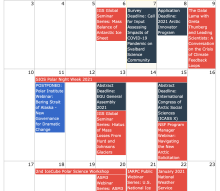
ARCUS' Arctic Calendar is an online, searchable calendar of major meetings and events relevant to the Arctic science, education, and policy communities. Due to the COVID-19 pandemic, many events have made postponements, cancellations, or have moved online. The calendar is updated daily to reflect these ongoing changes. We encourage anyone organizing an event to submit it for inclusion on the calendar. We also welcome other Arctic organizations to link to the Arctic Calendar. Events can be submitted through this online form or by emailing calendar [at] arcus.org
Happy Holidays from ARCUS!
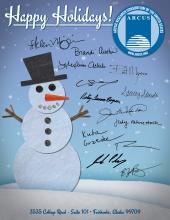
From all of us here at ARCUS, we wish you the very happiest and healthiest of holidays—and look forward to all that the Arctic research and education community will achieve together in 2021!
Witness Community Highlights

The December 2020 issue of Witness Community Highlights is now available online. This issue includes the article “NSF's Navigating the New Arctic Program: Projects Funded in 2020.” Navigating the New Arctic (NNA), one of NSF's 10 Big Ideas, has supported fundamental convergence research across the social, natural, environmental, engineering, and computing and information sciences since 2017. A wide range of topics and regions are represented in the 21 Arctic research projects that were funded in 2020. This article includes a list of the 2020-funded NNA projects, with brief descriptions.
ARCUS Early Career Conference Funding Award Winners Selected
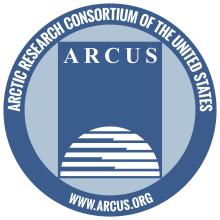
ARCUS would like to congratulate the winners of our first Early Career Conference Funding Award! This year’s 16 awardees received support for virtual conference registration and fees. Congratulations to: Mark England, Hayley Cynar, Allison Cluett, Shima Shams, Raven Mitchell, Adrian Charles, Courtney Collins, Patricia Johnston, Austin Roy, Lucia Gonzalez, Stephen Greenlaw, Joy O'Brien, Emily Fedders, Xueke Li, Ian Baxter, and Ingalise Kindstedt!
Fall 2020 Issue of Witness the Arctic

This issue includes updates from NSF’s Arctic Sciences Section; news of DOE’s reestablished Arctic Energy Office; an update on IARPC collaboration team activities; summary of a National Academies workshop report on global health and security risks associated with climate change; a report from the Polar Technology Community; information on a new service from the Arctic Data Center; an article about understanding two kinds of public knowledge of the polar regions; an article from a citizen science project investigating the dynamics of seasonal winter berry loss; news of the Toolik Field Station operations during COVID-19; updates from the Sea Ice Prediction Network–Phase 2 project; a summary of ARCUS member research updates; comments from the ARCUS Executive Director and the Board President; and a highlight of ARCUS member institution Cold Climate Housing Research Center and National Renewable Energy Laboratory.
ARCUS Community Coffee Chat
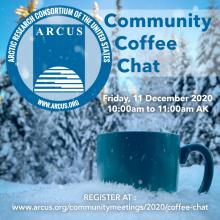
Please join ARCUS staff, Board members, and Institutional Member representatives on Friday, 11 December from 10-11am AK/11-12pm PT/12-1pm MT/1-2pm CT/2-3pm ET for a virtual coffee chat (tea, cocoa, &/or other beverages of your choice also welcome!). This online social hour will be an opportunity for members of the wider Arctic research community to share news, ask one another questions, and to explore next steps for some of the projects and ideas raised during the 2020 ARCUS Annual Meeting.
Navigating the New Arctic Projects Hub
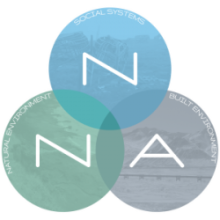
The Arctic Research Consortium of the U.S. (ARCUS) announces the availability of a new hub of webpages featuring information about each of Arctic research projects that have been supported through the National Science Foundation’s Navigating the New Arctic (NNA) program. Explore the site to learn more about NNA project activities, team members, and field site locations. The site also includes information about the newest round of 2020 NNA grantees.
Tiny Ice: Bits From Antarctica Video Series
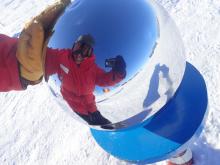
PolarTREC informal educator Jocelyn Argueta traveled to the South Pole in 2019 with the IceCube Neutrino Observatory and Askaryan Radio Array Expedition. She created a YouTube series Tiny Ice: Bits from Antarctica to highlight the travel, science, and life at the South Pole, both in English and Spanish. In this 10-part series, each topic is explained in 2-minute, digestible segments which include photos and videos from her trip, as well as anecdotes to help viewers get a personal perspective of Antarctica.
Arctic Resources for the American Geophysical Union Fall Meeting 2020
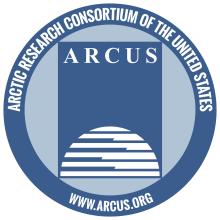
The Arctic Research Consortium of the U.S. (ARCUS) announces our ARCUS at AGU and the Arctic Sessions webpages for this year’s virtual American Geophysical Union (AGU) Fall Meeting. The Fall Meeting will be held online 1-17 December 2020. ARCUS has compiled a list of Arctic-relevant happenings to help attendees of the virtual AGU Fall Meeting 2020 find Arctic-related town halls, talks, posters, and other events. The complete list, which includes the day/time, session title, and type of event, is available on the Arctic Sessions webpage.
Witness Community Highlights

The October 2020 issue of Witness Community Highlights is now available online. This issue includes two articles—in the first article, “Creating Institutional Changes to Improve Indigenous Students' Learning Experiences,” an Arctic Indigenous Scholar shares her experiences in pursuing a degree in wildlife biology and suggests changes to make everybody feel capable and accepted in their field. The second article, “The Migration in Harmony RCN Investigates the Drivers and Consequences of Arctic Coastal Migrations,” is an overview of the three-year international, cross-disciplinary network aiming to investigate how drivers and consequences of Arctic coastal migrations intersect and interact with one another—and explore the related implications for society.
"After the Ice" Videos Now Available!
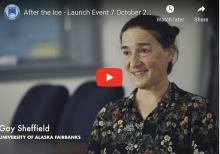
After the Ice, a three-part video series funded by SEARCH, captures the stories of Indigenous communities challenged by sea ice loss in Alaska’s Bering Sea. SEARCH sea ice scientists partnered with the Bering Sea Elders Group, an association of Alaska Native elders appointed by 39 Iñupiat and Yup’ik tribes in Alaska’s Yukon-Kuskokwim Delta and Bering Strait region, to create the films, which are now available through the SEARCH website.
2020 Sea Ice Outlook Interim Post-Season Report is Now Available Online
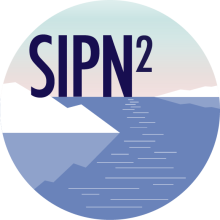
The 2020 Sea Ice Outlook Interim Post-Season Report is now available. The September monthly averaged sea ice extent at the end of the 2020 summer melt season was 3.92 million square kilometers. This is the second lowest in the satellite record that began in 1979.
This interim report is intended as a quick postseason update that summarizes how the outlooks did in comparison to the observed September monthly mean extent. A full post-season report, to be published in February 2021, will include an in-depth analysis of factors impacting sea ice this past summer, further discussion about the outlooks, comments on regional observation, predicted spatial fields, Antarctic contributions, and a summary from the Sea Ice Drift Forecast Experiment (SIDFEx).
Virtual Resources for the Classroom Now Available
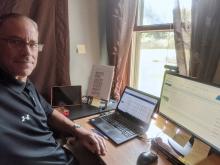
Teachers in the U.S. and abroad currently have the difficult task of adapting to virtual and hybrid classrooms during the pandemic. To assist teachers during this time, a number of PolarTREC lesson plans have been identified and assembled into a Virtual Resources Collection for online teaching. Other lesson plans are currently being adapted for online teaching, so remember to revisit the PolarTREC website for additional resources.
ARCUS Early Career Conference Funding Award
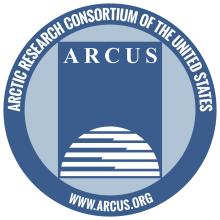
ARCUS is pleased to announce our new Early Career Conference Funding Award to support attendance of virtual conferences. This award program aims to increase accessibility of Arctic research for early career researchers and students, especially Black, Indigenous, and People of Color. The application period is open until 1 November 2020.
Launch Party for ‘After the Ice’ Film Series
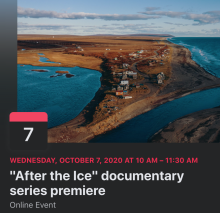
A virtual launch party will be held via Facebook Live and ZOOM on 7 October 2020 from 10-11am AK for a new mini-documentary series sharing stories of Indigenous communities challenged by sea ice loss in Alaska’s Bering Sea. 'After the Ice” is a three-part series created through a partnership between the Bering Sea Elders Group and the Study of Environmental Arctic Change program. The premier screening will be followed by a panel discussion with video-journalist Eli Kintisch, Arctic scientist Jennifer Francis, Bering Sea Elders Group executive director Mellisa Johnson and climate change educator Bill McKibben. .
Witness Community Highlights

The September 2020 issue of Witness Community Highlights is now available online. This issue includes two articles: “Seasonal Forecasting of Arctic Sea Ice and Atlantic Hurricanes,” describing efforts from the respective scientific communities to improve forecasting capabilities at seasonal time scales; and “Inuit Food Sovereignty and Self-Governance — A Healthy Arctic,” summarizing findings from the Inuit-led research and report that illuminates the Inuit values and management practices. Further, the report links Inuit Food Sovereignty to holistic and adaptive management strategies that can ensure the food security and well-being of Inuit throughout the Arctic for generations to come.
Polar Technology Conference Report Available
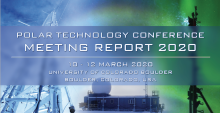
The meeting report from the 2020 Polar Technology Conference, held 10–12 March in Boulder, Colorado, is now available. The goal of the meeting was to link experts in polar science and technology development to discuss current technological resources for polar research and identify barriers to research and application of technology for problems unique to polar regions.
Seasonal Migration Resources Available
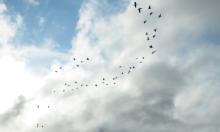
Just in time! PolarTREC educator Katie Gavenus (MOSAiC Expedition, 2019) recently shared resources on seasonal migration including activities for learning outside, at-home, and in school. Included is information on some of the longest migrating birds - the Arctic tern, as well as land migrators such as caribou. She also shares how to take part in community-based monitoring and citizen science projects and recommended films about migration.
2020 August Sea Ice Outlook Report is Now Available Online
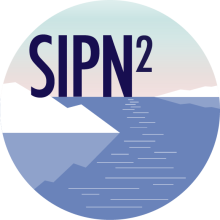
The 2020 August Sea Ice Outlook (SIO) report is now available online. The Sea Ice Outlook, an effort managed by the Sea Ice Prediction Network–Phase 2 (SIPN2), provides an open process for those interested in Arctic sea ice to share predictions and ideas. The monthly reports contain a variety of perspectives—from advanced numerical models to qualitative perspectives from citizen scientists. The Outlook is not an operational forecast.
For the 2020 August report, 39 contributions were received that included pan-Arctic predictions. Of those contributions, 10 included predictions for the Alaska Region and 7 included pan-Antarctic predictions. We received 13 submissions of sea-ice probability and 9 submissions of first ice-free date, and for the August report, ice advance dates were computed from four contributions. For 2020 we also invited contributors to submit initial conditions (sea-ice concentration and sea-ice thickness) of their forecasts to better understand how observations are being used in forecasts.
For the pan-Arctic, the median August Outlook value for September 2020 sea-ice extent is 4.30 million square kilometers, with quartiles of 4.1 and 4.5 million square kilometers. The median is close to the observed 2019 September sea-ice extent of 4.32 million square kilometers.
Arctic Research Seminar Series – Bridging Arts and Science
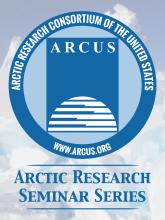
ARCUS invites registration for the next Arctic Research Seminar. This seminar, titled Bridging Arts and Science, will take place Monday, 21 September 2020 at 8:00 a.m. AKDT (9:00 a.m. PDT, 10:00 a.m. MDT, 11:00 a.m. CDT, 12:00 p.m. EDT).
The seminar will be presented by Matthew Burtner (University of Virginia), Leena Cho (University of Virginia), and Gabrielle Russomagno (School of Visual Arts). During this webinar presenters will discuss how their work spans science and the arts through media such as music, landscape architecture, and the visual arts.
Witness Community Highlights

The August 2020 issue of Witness Community Highlights is now available online. This issue includes two articles: “Activity Updates from the Arctic Domain Awareness Center,” an overview of the Center’s mission-driven research efforts and projects; and “Co-Producing Knowledge of Shorefast Ice in Uummannaq Bay, West Greenland,” describing research efforts to combine remote sensing technology with community-based monitoring and local and Indigenous knowledge to better understand how shorefast ice has changed as the Arctic warms and how these changes matter to individuals and communities in the Uummannaq region.
